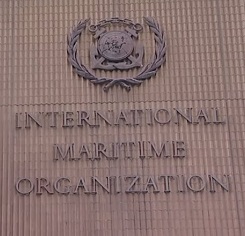[Op-Ed] CO2 Data Collection Decision Making Delayed
Intermanager’s Captain Paddy McKnight made this unsurprising statement about energy efficiency in shipping after attending MEPC 68 last week:
“Following consideration of the 17 documents submitted on the issue of energy efficiency, the approach advocated by the U.S. of data collection, data analysis and only then, decision making held most sway with member states.”
Member states are waiting to see what happens at UN climate change conference (UNFCCC COP 21 meeting) in Paris in December.
UNFCCC aims to establish a new global agreement to replace the Kyoto Protocol, but shipping emissions hardly rated a mention at COP 20 in December 2014, giving the industry more time to demonstrate progress in reducing CO2 emissions in the hope that it will not be forced to enact a levy scheme to contribute to the Climate Adaptation Fund.
Under the Kyoto Protocol, emissions from international shipping are excluded from national obligations and left as an IMO responsibility. Attempts to introduce market-based measures to reduce CO2 emissions has met with fierce resistance by the industry and developing states.
A key cause of contention is how to reconcile the UNFCCC principle of Common But Differentiated Responsibility, which means developing countries carry less of the financial burden of emissions reduction, with the IMO’s principle of equality for all nations.
Decision Making Still to Come
IMO’s plan to develop a data collection system for ship fuel consumption has proved difficult, and again at MEPC 68 there were 17 papers submitted followed by a clear rejection of what McKnight calls “decision making.”
 The Marshall Islands proposed that the IMO should undertake the work necessary to establish a greenhouse gas emission reduction target for international shipping consistent with keeping global warming below 1.5oC. The state wanted to agree measures necessary to achieve that target. They were thanked for their efforts and told their proposal was not aligned with the direction of current IMO efforts and could even hamper future work.
The Marshall Islands proposed that the IMO should undertake the work necessary to establish a greenhouse gas emission reduction target for international shipping consistent with keeping global warming below 1.5oC. The state wanted to agree measures necessary to achieve that target. They were thanked for their efforts and told their proposal was not aligned with the direction of current IMO efforts and could even hamper future work.
IMO has not yet decided if a data collection system for fuel consumption should be mandatory or voluntary, but it was decided that ships of 5,000 gross tons or above on international voyages should collect data on their total annual fuel consumption by fuel type in metric tons.
Flag Administrations will take Responsibility
ABS reports that while there was some support for the development of guidelines to facilitate consistency, quality and robustness of the reported data, it was ultimately agreed the responsibility rests with the flag administration to verify the data submitted and to decide on how this verification is to be accomplished. Reported data would not be included in or appended to the International Energy Efficiency Certificate – only a Statement of Compliance would be issued to the ship after complying with the provisions of the system for a given year as evidence for port state control verification.
Further discussions are required on data other than fuel consumption to be reported under the system. Aside from the determination of whether data collection will be mandatory or voluntary, the IMO is considering the inclusion of “transport work” or suitable proxies.
This is clearly the most substantial outstanding item, says ABS in their review of MEPC 68. “There is a general view for consideration of distance travelled and service hours as potential proxies that may facilitate a reasonable calculation of vessel efficiency. Expanding the discussion to cargo weight/volume would afford more precise efficiency calculations, but this comes at a significant cost in terms of complexity and burden. Additionally, this raises issues that are commercially sensitive. It was agreed that confidentiality of data reported and subsequently extracted from the data base requires further consideration.”
ICS Says Good Progress Made
The International Chamber of Shipping (ICS) feels that MEPC 68 made good progress on draft text that will mandate a global data collection system on CO2 emissions from shipping. This is something which ICS fully supports, provided it is simple to administer and will not ultimately be used to develop a market based measure or some other over complicated mechanism that could lead to serious market distortion.
In April, the European Council approved a new shipping regulation on the monitoring, reporting and verification of CO2 emissions, as part of its overall strategy to reduce greenhouse gas emissions by 2050. ICS is pleased that the IMO rejected the idea (contained in the E.U. regulations) that commercially sensitive data about individual ships should be published.
 ICS says that, while some form of metric to account for transport work in addition to fuel consumption remains on IMO’s agenda, this now seems likely to be simpler than the metric contained within the E.U. regulation. It is therefore more likely to be acceptable to ICS. However, warns ICS, discussion within the IMO on this controversial aspect is far from over and will continue at the next MEPC meeting in April 2016.
ICS says that, while some form of metric to account for transport work in addition to fuel consumption remains on IMO’s agenda, this now seems likely to be simpler than the metric contained within the E.U. regulation. It is therefore more likely to be acceptable to ICS. However, warns ICS, discussion within the IMO on this controversial aspect is far from over and will continue at the next MEPC meeting in April 2016.
ICS Secretary General, Peter Hinchliffe said: “There is still a great deal of uncertainty as to where the issue of CO2 data collection is leading. The European Commission still appears to see the next step as being to use this data to establish a mandatory operational indexing system that can eventually be used to charge ships money. The fact that commercially sensitive data about individual ships will not be published under the IMO system does not prevent this goal from being pursued. The same applies to the E.U. system, even if the European Commission agrees to align its system more closely with that eventually agreed by IMO by dropping the publication element, which is by no means certain”.
However, progress is viewed at MEPC 68, the industry runs the risk, as demonstrated by the E.U. requirements, that forces outside the industry will start mandating, probably unwelcome, action. All eyes will be on COP 21 to see if the U.N. will follow the E.U. lead and this time take a closer look at shipping.
The E.U. System
Lloyd’s Register has summarized the E.U. regulations that will enter into force on July 1, 2015:
Monitoring
From 31 August, 2017, all vessels over 5,000gt trading to, from and between ports in the jurisdiction of E.U. member states will be required to carry on board a CO2 monitoring plan that has been reviewed by a third party verifier. This plan must contain:
• vessel and company details
• details of emission sources
• procedures for plan updates
• procedures for monitoring voyage times and distances
• procedures for monitoring time spent in port/at anchor
• procedures for monitoring fuel consumption, including: the monitoring method used; details of measuring instruments and data management; and the density calculation method
• the emissions factors used for each type of fuel
• procedures for monitoring and recording cargo and passenger levels for each voyage.
Monitoring will be on a per-voyage basis, and data will be aggregated into an annual emissions report. The first reporting period requiring monitoring will be January 1, 2018, to December 31, 2018.
 Verification
Verification
Once monitoring is completed, data collected in accordance with the monitoring plan will require verification by an approved third party. Once the verification process is successfully completed, the vessel will be issued a Document of Compliance which will need to be kept on board for inspection. The penalties for failing to carry a Document of Compliance include vessel detention and the issue of an Expulsion Order that prohibits entry into E.U. ports.
Reporting
From 2019, verified annual reports must be submitted to the E.U. Commission and the flag authority for each vessel by April 30 each year. These reports will consist of:
• vessel and company details
• EEDI or EIV information (as applicable)
• the monitoring methods used
• the results of the annual monitoring.
The Commission will make this information publicly available by June 30 each year.
The opinions expressed herein are the author's and not necessarily those of The Maritime Executive.
The opinions expressed herein are the author's and not necessarily those of The Maritime Executive.
